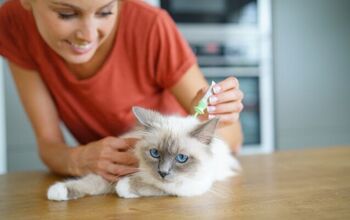Cats Crave Carbs, Dogs Love Fat - And That's Okay!

Research suggests our pets know exactly what their bodies need.
For anyone who has shared close quarters with a fur-kid, you already know the messy outcome that happens when you cave in and offer up that rich, fatty treat buddy has been eyeballing. Particularly for dogs (like mine) that are prone to bouts of pancreatitis and live on a lower-fat diet, the result can be quick and let’s say, memorable.
So, that’s why a study published a few years back in the Journal of Experimental Biology and recently resurrected by the research group Science Daily, caught my eye. It’s a rather interesting report on the eating habits of dogs and cats that somewhat denounces what many of us have always believed. That is, because they’re naturally carnivorous, our pets have a near-insatiable need for protein. A compulsion that harkens back to their origins when animals survived in the wild by hunting, killing, and eating raw meat.
That sounds right, but is not necessarily so.
In the study I refer to, animals were offered protein-rich options as well as foods with higher fat or carb content. But neither the cats or the dogs picked the higher protein food.
It seems our dogs’ bodies actually do crave all that high-fat food we make a point of not providing. While cats… drum roll please… jump at the chance to chow down on carbs over protein! Now, it’s important to note that during the study four types of food were used and all tasted equally good – so palatability was not a determining factor in which food they chose.
Researchers studied 17 healthy adult dogs and 27 cats over four weeks. Each day the dogs were given one hour to eat as much as they felt they wanted - up to a pre-determined level sufficient to meet their metabolic requirements. Similarly, the cats were given unlimited access to food but for the felines, it was over 24 hours. Because we all know cats like to nosh while dogs tend to gobble.
Leading the study was a Professor of Veterinary Medicine at Oregon State University, Jean Hall who stated, "The numbers were much different than what traditional thinking would have expected. Some experts have thought cats need diets that are 40 or 50 percent protein. Our findings are quite different than the numbers used in marketing and are going to really challenge the pet food industry."
Making this study unique was the effort to ensure all foods tasted good. Animals weren’t choosing one over the other due to taste. Hall notes that palatability has not been a consideration in past studies however “when you balance palatability, both dogs and cats prefer significantly different macronutrient content than what they would choose based on taste."
The American Kennel Club (AKC) confirms that dietary proteins contribute to important physiological functions such as hormone production, vision and making the eater feel satiated. However, dietary fat provides twice the energy of protein, acting as a source of essential fatty acids, and supporting both cell and immune function.
So, maybe that survival instinct we envision our pets have really does exist. And they already know what foods will serve them better in the long haul.

Sharing space with three seriously judgy Schnoodles and a feline who prefers to be left alone. #LivingMyBestLife
More by Mary Simpson























